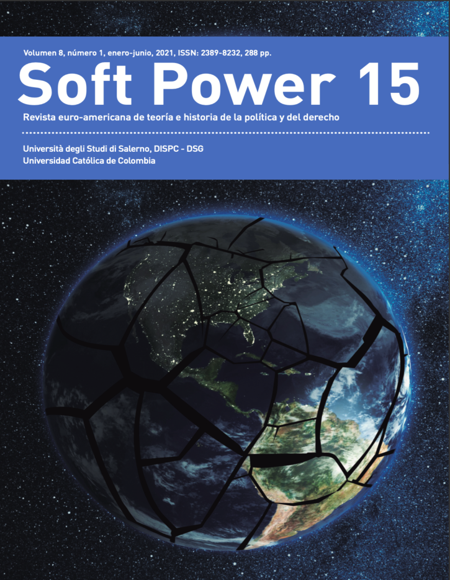
Este trabalho está licenciado sob uma licença Creative Commons Attribution-NonCommercial 4.0 International License.
Al enviar los artículos para su evaluación, los autores aceptan que transfieren los derechos de publicación a Soft Power. Revista Soft Power para su publicación en cualquier medio. Con el fin de aumentar su visibilidad, los documentos se envían a bases de datos y sistemas de indización, así mismo pueden ser consultados en la página web de la Revista.Resumo
If, as is true, one of the thorniest issues within the debate on neoliberalism is the role played by law and the state, then the book by Orsetta Giolo (2020) is to be favourably welcomed as it represents a useful contribution to the construction of a clearer framework on this problem that has indefinite boundaries.
Among the numerous opportunities for reflection offered by the text, it is certainly worth dwelling on the phenomenon that Giolo (2020) appropriately defines neoliberal binarism, that is, the reticular and authoritarian character of neoliberal law, corresponding to two different legal environments inhabited by different subjects: the first one is represented by governance and the metaphor of the network, aimed at promoting freedom and optimizing competition; the second one is represented by penal state, aimed at the annihilation of political agency and the exclusion of subjects that are not adjusted to neoliberal standards (p. 24).

Referências
Bazzicalupo, L. (2020). Paradossi della responsabilità di governare, tra autorità e legittimazione
tecnica. Etica & Politica, 22(2), 189-202.
Bisogni, G. (2005). Weimar e l’unità politica e giuridica dello Stato. Saggio su Rudolf
Smend, Hermann Heller, Carl Schmitt. Napoli: ESI.
Bonefeld, W. (2017). The Strong State and the Free Economy. London: Rowman & Littlefield
International.
Bourdieu, P. (1998). Contre-feux. Propos pour server à la résistance contre l’invasion néolibérale.
Paris: Raison d’agir.
Brindisi, G. (2020). Neoliberalismo autoritario, Stato democratico di diritto e populismo
regressivo. La costruzione dell’ordine sociale attraverso il pericolo. Rassegna di
diritto pubblico europeo, (1), 17-45.
Brown, W. (2010). “We Are All Democrats Now…”. In Democracy in What State? New
York: Columbia University Press, 44-57.
Brown, W. (2019). In the Ruins of Neoliberalism. The Rise of Antidemocratic Politics in
West. New York: Columbia University Press.
Chamayou, G. (2018). La société ingouvernable. Une généalogie du liberalism autoritaire.
Paris: La fabrique éditions.
Crozier, M.J., Huntington, S.P., Watanuki, J. (1975). The Crisis of Democracy. Report on
the Governability on Democracies to the trilateral Commission. New York: New York
University Press.
Dardot, P., Laval, Ch. (2019). Anatomie du nouveau néolibéralisme. Contretemps, (46).
De Fiores, C. (2020). Unione europea e legittimazione politica. Un ordinamento “irresponsabile”.
Etica e politica, 22(2), 361-378.
De Carolis, M. (2017). Il rovescio della libertà. Tramonto del neoliberalismo e disagio
della civiltà. Macerata: Quodlibet.
Dogliani, M. (1994). Introduzione al diritto costituzionale. Bologna: il Mulino.
Dogliani, M. (2004). Le masse abbandonate. Nuvole, (24), 1-4.
Foucault, M. (1995). Discipline and Punish. The Birth of the Prison (1975). English translation
by A. Sheridan. New York: Vintage Books.
Foucault, M. (2008). The Birth of Biopolitics. Lectures at the Collège de France 1978-
Ed. by M. Senellart, English edition by A.I. Davidson, English translation by G.
Burchell. New York: Palgrave Macmillan.
Galli, C. (2019). Carl Schmitt: politica ed economia nella crisi di Weimar. Filosofia politica,
(1), 45-54.
Giolo, O. (2020). Il diritto neoliberale. Napoli: Jovene.
Hall, S. et al. (1978). Policing the Crisis: Mugging, the State, and Law and Order. Honk
Hong: Macmillan Press.
Heller, H. (2015). Authoritarian Liberalism? (1933). European Law Journal, 21(3), 295-
Laclau, E. (2005). La razón populista. Buenos Aires: Fondo de cultura Económica.
Laval, Ch. (2017). Foucault et Bourdieu : à chacun son néolibéralisme?. Cartografie sociali.
Rivista di sociologia e scienze umane, (4), 231-244.
Laval, Ch. (2018). Foucault, Bourdieu et la question néolibérale. Paris: La découverte.
Mouffe, C. (2018). For a Left Populism. New York: Verso.
Neumann, F.L. (1957a). Economics and Politics in the Twentieth Century (1951). In F.L.
Neumann, The Democratic and the Authoritarian State: Essays in Political and Legal
Theory (pp. 199-228). New York: Free Press.
Neumann, F.L. (1957b). Anxiety and Politics (1954). In F.L. Neumann, The Democratic
and the Authoritarian State: Essays in Political and Legal Theory (pp. 270-295). New
York: Free Press.
Neumann, F.L. (2009). Behemoth: The Structure and Practice of National Socialism, 1933-
(1942). Chicago: Ivan R. Dee and United States Holocaust Memorial Museum.
Pomarici, U. (2017). Postfazione. In H. Heller (ed.), Stato di diritto o dittatura? E altri
scritti (1928-1933). Napoli: Editoriale Scientifica.
Poulantzas, N. (1978). L’État, le Pouvoir, le Socialisme. Paris: PUF.
Preterossi, G. (2015). Ciò che resta della democrazia. Laterza: Roma-Bari.
Schmitt, C. (1998). Strong State and Sound Economy (1932). In Appendix to R. Cristi,
Carl Schmitt and Authoritarian Liberalism (pp. 212-32). Cardiff: University of Wales
Press.
Somek, A. (2003). Authoritarian Constitutionalism: Austrian Constitutional Doctrine
to 1938 and Its Legacy. In Ch. Joerges, N. Singh Ghaleigh (Eds.), Darker Legacies
of Law in Europe: The Shadow of National Socialism and Fascism over Europe and
its Legal Traditions (pp. 361-388). Oxford: Hart Publishing.
Somma, A. (2018). Sovranismi. Stato, popolo e conflitto sociale. Roma: DeriveApprodi.
Streeck, W. (2015). Heller, Schmitt and the Euro. European Law Journal, 21(3), 361-370.
Tarizzo, D. (2020). «Ubi est fiscus, ibi est imperium». Sovranità, democrazia, Europa.
Filosofia politica, (2), 269-286.
Tucci, A. (2015). Le droit entre répression et «productivité». In J.-F. Kervégan, M. Plouviez,
P.-Y. Quivigier (Éds.), Norme et violence (pp. 115-127). Zurich-New York: Olms







